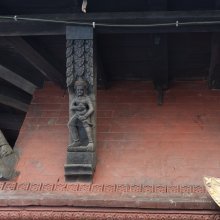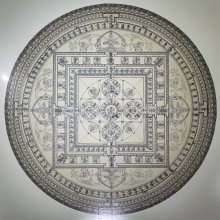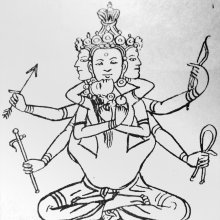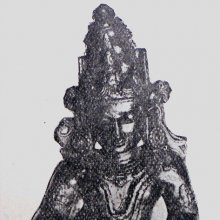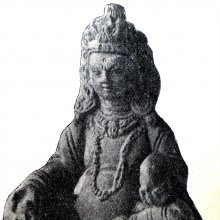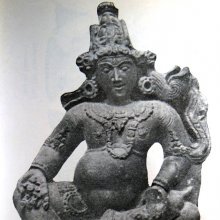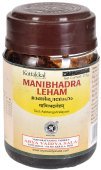Manibhadra, Maṇibhadra, Maṇibhadrā, Māṇibhadra: 27 definitions
Introduction:
Manibhadra means something in Buddhism, Pali, Hinduism, Sanskrit, Jainism, Prakrit, the history of ancient India. If you want to know the exact meaning, history, etymology or English translation of this term then check out the descriptions on this page. Add your comment or reference to a book if you want to contribute to this summary article.
Images (photo gallery)
In Hinduism
Shaktism (Shakta philosophy)
Source: Wisdom Library: Śrīmad Devī BhāgavatamMaṇibhadra (मणिभद्र):—One of the persons joining Śiva during the preparations of the war between Śankhacūḍa and the Devas, according to the Devī-bhāgavata-purāṇa (9.20.22-53). All persons attending were remained seated on beautiful aerial cars, built of jewels and gems. The war was initiated by Puṣpadanta (messenger of Śiva) who was ordered to restore the rights of the Devas. .

Shakta (शाक्त, śākta) or Shaktism (śāktism) represents a tradition of Hinduism where the Goddess (Devi) is revered and worshipped. Shakta literature includes a range of scriptures, including various Agamas and Tantras, although its roots may be traced back to the Vedas.
Purana and Itihasa (epic history)
Source: archive.org: Puranic Encyclopedia1) Maṇibhadra (मणिभद्र).—A Yakṣa. He who worships this Yakṣa would get his desire fulfilled. This Yakṣa is installed in a temple near the city of Tāmralipti. If anybody commits adultery in that place Maṇibhadra would take him to the temple and keep him there for the night. Next morning he would take the couple before the King and exposing the sin would get them killed by the King.
Once a Vaiśya named Samudradatta committed adultery and another house-holder found it out and took them to the temple of Maṇibhadra and kept them there Śaktimatī, the virtuous wife of Samudradatta came to know of the mishap to her husband and the intelligent woman went to the temple with materials for worship and under the pretext of worshipping made the priest of the temple open the doors. When she entered Samudradatta felt ashamed and sat with his head bent down. Śaktimatī gave the other woman her own dress taking hers in return and sent her out as Śaktimatī without raising the least suspicion in the priest. Then she remained with Samudradatta, and when in the morning officers of the King came to take them they were surprised to find that the culprits were really husband and wife. The house-holder was punished for giving wrong information and Samudradatta was set free with his wife. (Kathāmukhalambaka, Kathāsaritsāgara). (See full article at Story of Maṇibhadra from the Puranic encyclopaedia by Vettam Mani)
2) Maṇibhadra (मणिभद्र).—A King of the Lunar dynasty. This King had many children of his wife Kavikā. Of these seven sons learned magic from Maya. The seven palm trees which Śri Rāma broke by an arrow while on his search for Sītā were but the cursed forms of these seven sons. The Purāṇic story relating to Śrī Rāma giving them relief from the curse is narrated in the Kiṣkindhā Kāṇḍa of Kamba Rāmāyaṇa.
2) The seven sons of Maṇibhadra after learning magic from Maya created a huge cobra and travelled all over the world on it. One day they reached a mountain near Ṛṣyamūkācala. They saw the sage Agastya coming that way and just to tease him they coiled that cobra and hid it beneath the ground in the form of a circle and they themselves stood on it as seven palm trees in a circle and caused obstruction to the sage in his path. The sage as he came near the trees knew by his spiritual powers what trick had been played on him and said cursing, "May you stand like this for ever". The princes knew the hideousness of the curse and pleaded for redress and the sage said, "After centuries the incarnation of Viṣṇu as Śrī Rāma would come and give you salvation".
3) Maṇibhadra (मणिभद्र).—General information. A Yakṣa. He was a deity of merchants and travellers. (Śloka 130, Chapter 64, Vana Parva). Other details.
(i) He stays in the court of Kubera. (Śloka 15, Chapter 10, Sabhā Parva).
(ii) Once this Yakṣa on the request of a cloud named Kuṇḍadhāra gave a boon to a brahmin. (Śloka 21, Chapter 171, Śanti Parva).
(iii) The sage Aṣṭāvakra once welcomed this Yakṣa. (Śloka 33, Chapter 19, Anuśāsana Parva).
(iv) When Arjuna went to Marutta to bring his wealth Arjuna worshipped this Yakṣa and the Yakṣa blessed him. (Śloka 7, Chapter 65, Aśvamedha Parva).
4) Māṇibhadra (माणिभद्र).—A Pārṣada of Śiva. (See under Candrasena II).
Source: archive.org: Shiva Purana - English TranslationMaṇibhadra (मणिभद्र) refers to the brother of Kubera, according to the Śivapurāṇa 2.2.37. Accordingly:—“[...] after uprooting his enemies, like a lion the elephants of the forest, Vīrabhadra surveyed all the quarters frequently to know ‘who is where’. He struck and smashed Bhṛgu while the valorous Maṇibhadra kicked him on his chest and plucked off his moustaches”.
Note: Maṇibhadra is the brother of Kubera and chief of the Yakṣas. He is the tutelary deity of travellers and merchants.
Source: Cologne Digital Sanskrit Dictionaries: The Purana IndexMaṇibhadra (मणिभद्र).—A son of Rajatanābha, (Bhadrā, Vāyu-purāṇa) married Puṇyajanī who was the mother of a number of Yakṣas;1 the commander of the army of the Yakṣas living in Candraprabhā; lived on the hill adjoining Caitraratha;2 devoted to Lalitā;3 Yakṣa senāpati.4
- 1) Brahmāṇḍa-purāṇa III. 7. 120; Vāyu-purāṇa 69. 152, 157.
- 2) Brahmāṇḍa-purāṇa II. 18. 7-8; Matsya-purāṇa 121. 8-9.
- 3) Brahmāṇḍa-purāṇa IV. 33. 78.
- 4) Vāyu-purāṇa 47. 7.

The Purana (पुराण, purāṇas) refers to Sanskrit literature preserving ancient India’s vast cultural history, including historical legends, religious ceremonies, various arts and sciences. The eighteen mahapuranas total over 400,000 shlokas (metrical couplets) and date to at least several centuries BCE.
Kavya (poetry)
Source: Wisdom Library: KathāsaritsāgaraMaṇibhadra (मणिभद्र) is the name of a powerful Yakṣa according to the story “Śaktimatī and her husband” found in the Kathāsaritsāgara, chapter 13.
Maṇibhadra (मणिभद्र) is the brother of Kuvera, according to the Kathāsaritsāgara, chapter 121. Accordingly, as Mahendrāditya asked his messenger Anaṅgadeva: “... I am Madanamañjarī, the daughter of Dundubhi, the King of the Yakṣas, and the wife of Maṇibhadra, the brother of Kuvera. I used always to roam about happily with my husband on the banks of rivers, on hills, and in charming groves...”.
The Kathāsaritsāgara (‘ocean of streams of story’), mentioning Maṇibhadra, is a famous Sanskrit epic story revolving around prince Naravāhanadatta and his quest to become the emperor of the vidyādharas (celestial beings). The work is said to have been an adaptation of Guṇāḍhya’s Bṛhatkathā consisting of 100,000 verses, which in turn is part of a larger work containing 700,000 verses.

Kavya (काव्य, kavya) refers to Sanskrit poetry, a popular ancient Indian tradition of literature. There have been many Sanskrit poets over the ages, hailing from ancient India and beyond. This topic includes mahakavya, or ‘epic poetry’ and natya, or ‘dramatic poetry’.
Shaivism (Shaiva philosophy)
Source: academia.edu: Yakṣiṇī-sādhana in the Kakṣapuṭa tantraMaṇibhadra (मणिभद्र) is the name of one of the thirty-two Yakṣiṇīs mentioned in the Kakṣapuṭatantra. In the yakṣiṇī-sādhana, the Yakṣiṇī is regarded as the guardian spirit who provides worldly benefits to the practitioner. The Yakṣiṇī (e.g., Maṇibhadra) provides, inter alia, daily food, clothing and money, tells the future, and bestows a long life, but she seldom becomes a partner in sexual practices.

Shaiva (शैव, śaiva) or Shaivism (śaivism) represents a tradition of Hinduism worshiping Shiva as the supreme being. Closely related to Shaktism, Shaiva literature includes a range of scriptures, including Tantras, while the root of this tradition may be traced back to the ancient Vedas.
In Buddhism
Tibetan Buddhism (Vajrayana or tantric Buddhism)
Source: Wisdom Library: Tibetan BuddhismMaṇibhadra (मणिभद्र) is the name of a deity summoned by the Yamāntaka-mantra and mentioned as attending the teachings in the 6th century Mañjuśrīmūlakalpa: one of the largest Kriyā Tantras devoted to Mañjuśrī (the Bodhisattva of wisdom) representing an encyclopedia of knowledge primarily concerned with ritualistic elements in Buddhism. The teachings in this text originate from Mañjuśrī and were taught to and by Buddha Śākyamuni in the presence of a large audience (including Maṇibhadra).
Source: archive.org: The Indian Buddhist Iconography1) Māṇibhadra (माणिभद्र) and Citrakālī refers to one of the eight Yakṣa and Śakti pair occupying the double lotus in the sādhana of Jambhala (yab-yum form), as described in the 5th-century Sādhanamālā (a collection of sādhana texts that contain detailed instructions for rituals).—Accordingly, when represented in Yab-Yum, he sits on the moon under which there is a double lotus of eight petals. [...] The eight petals of the lotus seat are occupied by the eight Yakṣas [viz., Māṇibhadra], who are identical in all respects with the principal figure. Each Yakṣa is accompanied by a Śakti [viz., Citrakālī] with whom he remains in Yab-Yum in the same way as Jambhala remains with Vasudhārā [...]. The Yakṣiṇīs are identical in form with Vasudhārā, who is yellow in complexion, carries the ears of corn and shows the Varada-mudrā in her two hands.]
2) Māṇibhadra (माणिभद्र) refers to eight Yakṣa kings, commonly depicted in Buddhist Iconography, and mentioned in the 11th-century Niṣpannayogāvalī of Mahāpaṇḍita Abhayākara.—The Yakṣas are a semi-mythical class of beings who are supposed to preside over treasures and shower wealth on mankind when propitiated. They are all collectively described in the dharmadhātuvāgīśvara-maṇḍala in one brief sentence:—“The Yakṣa kings [viz., Māṇibhadra] hold in their hands the bījapūra (citron) and the nakula (mongoose) in the right and left hands respectively”.—Māṇibhadra is yellow in colour.
Source: Wisdomlib Libary: VajrayanaManibhadra is the name of a mahāsiddha, of which eighty-four in total are recognized in Vajrayāna (tantric buddhism). His title is “the happy housewife”. He lived somewhere between the 8th and the 12th century AD.
These mahāsiddhas (e.g., Manibhadra) are defined according to the Abhayadatta Sri (possibly Abhayākaragupta) tradition. Its textual origin traces to the 11th century caturāsiti-siddha-pravṛtti, or “the lives of the eighty-four siddhas”, of which only Tibetan translations remains. Manibhadra (and other Mahāsiddhas) are the ancient propounders of the textual tradition of tantric or Vajrayana Buddhism.
Source: OSU Press: Cakrasamvara SamadhiMānibhadra (मानिभद्र) is the name of a deity [i.e., oṃ mānibhadrāya svāhā], according to the Kalaśa Pūjā [i.e., Kalasha Worship] ritual often performed in combination with the Cakrasaṃvara Samādhi, which refers to the primary pūjā and sādhanā practice of Newah Mahāyāna-Vajrayāna Buddhists in Nepal.

Tibetan Buddhism includes schools such as Nyingma, Kadampa, Kagyu and Gelug. Their primary canon of literature is divided in two broad categories: The Kangyur, which consists of Buddha’s words, and the Tengyur, which includes commentaries from various sources. Esotericism and tantra techniques (vajrayāna) are collected indepently.
Mahayana (major branch of Buddhism)
Source: archive.org: Bulletin of the French School of the Far East (volume 5)Maṇibhadra (मणिभद्र) is the name of a Yakṣa appointed as one of the Divine protector deities of Tivani, according to chapter 17 of the Candragarbha: the 55th section of the Mahāsaṃnipāta-sūtra, a large compilation of Sūtras (texts) in Mahāyāna Buddhism partly available in Sanskrit, Tibetan and Chinese.—In the Candragarbhasūtra, the Bhagavat invites all classes of Gods and Deities to protect the Law [dharma?] and the faithful in their respective kingdoms of Jambudvīpa [e.g., the Yakṣa Maṇibhadra in Tivani], resembling the time of the past Buddhas.
Maṇibhadra (मणिभद्र) [?] is also the name of a Yakṣa appointed as one of the Divine protector deities of Cīnasthāna.

Mahayana (महायान, mahāyāna) is a major branch of Buddhism focusing on the path of a Bodhisattva (spiritual aspirants/ enlightened beings). Extant literature is vast and primarely composed in the Sanskrit language. There are many sūtras of which some of the earliest are the various Prajñāpāramitā sūtras.
General definition (in Buddhism)
Source: China Buddhism Encyclopedia: BuddhismManibhadra was the daughter of a wealthy family in Agarce. As was their custom, she was betrothed at the age of 13 to a man of her own caste, but lived with her parents until old enough to take up her wifely duties. One day, while in her mother’s kitchen, the guru Kukkuripa came to her house begging for food. She welcomed him and served him with her own hands, then asked why he chose to be as he is now and not lead a comfortable life with a family. At that, the yogin laughed and explained the preciousness of a human birth as an opportunity to make spiritual progress and to free himself from the wheel of rebirth. Manibhadra’s faith was kindled and her trust of the yogin made her beg for him to show her the way to liberation. The yogin told her she could find him in the cremation grounds if she wanted more information, which was what she did that night.
Manibhadra levitated into the sky and remained there for 21 days, giving instruction to the people of Agarce. Then she bid farewell to her family and friends, and was assumed bodily into the Paradise of the Dakinis.
etymology: མ་ཎི་བྷ་དྲཱ།; Maṇibhadrā;
Manibhadra: “The Happy Housewife”;
Mahasiddha Manibhadra: “She of the Broken Pot”, or / The Model Wife”
In Jainism
General definition (in Jainism)
Source: Wisdom Library: Jainism1) Maṇibhadra (मणिभद्र) is the Sanskrit rendering of Māṇibhadda, a Yakṣa chief obiedient to Vaiśramaṇa (god of wealth, also known as Kubera), Bhagavatī-sūtra, also known as The Vyākhyāprajñapti (“Exposition of Explanations”). The Bhagavatī-sūtra is the largest of twelve Jain āgamas and was composed by Sudharmāsvāmī in the 6th century.
2) Maṇibhadra (मणिभद्र) is the name of a Yakṣa mentioned in the Tattvārtha-bhāṣya amongst a list of thirteen. The Tattvārtha-bhāṣya is a commentary on the Tattvārtha-sūtra, an ancient and foundational Jain text written in the 2nd century by Umāsvāti. It contains philosophy accepted as authoritative by both the Digambara and the Śvetāmbara sects of Jainism.
3) Maṇibhadra (मणिभद्र) refers to a class of yakṣa deities according to both the Śvetāmbara and the Digambara traditions. The yakṣas refer to a category of vyantaras gods which represents one of the four classes of celestial beings (devas). The assigned color of yakṣas is black and their caitya-vṛkṣa (sacred tree) is the “banyan tree” (vaṭa).
The deities such as the Maṇibhadras are defined in ancient Jain cosmological texts such as the Saṃgrahaṇīratna in the Śvetāmbara tradition or the Tiloyapaṇṇati by Yativṛṣabha (5th century) in the Digambara tradition.
4) Maṇibhadra (मणिभद्र).—One of the nine peaks (kūṭa) of the Vaitāḍhya mountains, which is situated in the center of Bhārata (parallel to the Himavān). The name dakṣiṇārdhabharata is derived from the similarly named deity presiding over it. Bhārata is one of the seven regions (kṣetra) of Jambūdvīpa according to Jaina cosmology. Jambūdvīpa sits at the centre of madhyaloka (‘middle world’) is the most important of all continents and it is here where human beings reside.
Source: archive.org: The Jaina IconographyMaṇibhadra (मणिभद्र) refers to one of the various attendants of Kubera (king of the Yakṣas).—Kubera was the treasurer of Śiva and lord of the Alakā is several times referred to in early Hindu literature. His attendants were many and several of them are mentioned in a canonical text of the Jainas thus, [viz., Maṇibhadra].
Source: archive.org: Trisastisalakapurusacaritra1) Māṇibhadra (माणिभद्र) is the friend of the merchant Dhana (the first incarnation of Ṛṣabha), as mentioned in chapter 1.1 [ādīśvara-caritra] of Hemacandra’s 11th century Triṣaṣṭiśalākāpuruṣacaritra: an ancient Sanskrit epic poem narrating the history and legends of sixty-three illustrious persons in Jainism. Accordingly, “[...] then the merchant [Dhana] set out with horses, camels, carts, and oxen moving to and fro, like the ocean with its high waves. [...]. Dhana went at the head of the caravan and a friend of his, Māṇibhadra, brought up the rear. They advanced unhindered, attended by multitudes of horsemen at their sides. With his white umbrellas he made the sky look as if it were made of autumn clouds, and with his peacock-feather umbrellas he made it look as if made of rainy-season clouds. His merchandise, difficult to carry, was carried by camels, buffaloes, fine oxen, mules and donkeys, like the earth by the dense winds”.
2) Māṇibhadra (माणिभद्र) and Pūrṇabhadra are the two Indras (i.e., lords or kings) of the Yakṣas who came to the peak of Meru for partaking in the birth-ceremonies of Ṛṣabha, according to chapter 1.2.
Source: HereNow4u: Lord Śrī MahāvīraMaṇibhadra (मणिभद्र) is the name of a sacred spot visited by Mahāvīra during his 27th year as Kevalī.—Leaving Nālandā the Lord moved towards Videha and wandering, sat at Maṇibhadra caitya in Mithilā. King Jitaśatru came there. The Lord gave sermon to a large gathering. The Lord gave sermon to a large gathering. Indrabhūti and other monk disciples asked questions regarding the Sun's movement in the orbit, expanse of the rays of the Sun and shadow, the waxing and waning of the Moon, the reasons for planetary oppression, birth of a meteor, beginning of an era, etc. The Lord spent that year’s cāturmāsa Mithilā.
Source: Encyclopedia of Jainism: Tattvartha Sutra 4: The celestial beings (deva)Maṇibhadra (मणिभद्र) refers to one of the two Indras (lords) of the Yakṣa class of “peripatetic celestial beings” (vyantara), itself a main division of devas (celestial beings) according to the 2nd-century Tattvārthasūtra 4.6. Pūrṇabhadra and Maṇibhadra are the two lords in the class ‘treasure-keeper’ peripatetic celestial beings.

Jainism is an Indian religion of Dharma whose doctrine revolves around harmlessness (ahimsa) towards every living being. The two major branches (Digambara and Svetambara) of Jainism stimulate self-control (or, shramana, ‘self-reliance’) and spiritual development through a path of peace for the soul to progess to the ultimate goal.
India history and geography
Source: archive.org: Personal and geographical names in the Gupta inscriptionsMaṇibhadra (मणिभद्र) or Maṇibhadrakṣetra is a place-name classified as a kṣetra and mentioned in the Gupta inscription No. 52. The Gupta empire (r. 3rd-century CE), founded by Śrī Gupta, covered much of ancient India and embraced the Dharmic religions such as Hinduism, Buddhism and Jainism. This field belongs to Maṇibhadra literally meaning ‘the excellent jewel’. Maṇibhadra has been the name of a brother of Kubera and king of the Yakṣas (the tutelary deity of travellers and merchants).

The history of India traces the identification of countries, villages, towns and other regions of India, as well as mythology, zoology, royal dynasties, rulers, tribes, local festivities and traditions and regional languages. Ancient India enjoyed religious freedom and encourages the path of Dharma, a concept common to Buddhism, Hinduism, and Jainism.
Languages of India and abroad
Sanskrit dictionary
Source: Cologne Digital Sanskrit Dictionaries: Shabda-Sagara Sanskrit-English DictionaryMaṇibhadra (मणिभद्र).—m.
(-draḥ) 1. One of the Jinas, or Jaina deified teachers. 2. A name of the king of the Yakshas.
Source: Cologne Digital Sanskrit Dictionaries: Benfey Sanskrit-English DictionaryMaṇibhadra (मणिभद्र).—m. a name of Kuvera, [Nala] 12, 130. Sarvatobhº, i. e.
Maṇibhadra is a Sanskrit compound consisting of the terms maṇi and bhadra (भद्र).
Source: Cologne Digital Sanskrit Dictionaries: Cappeller Sanskrit-English DictionaryMaṇibhadra (मणिभद्र).—[masculine] [Name] of a king of the Yakṣas.
Source: Cologne Digital Sanskrit Dictionaries: Aufrecht Catalogus CatalogorumMaṇibhadra (मणिभद्र) as mentioned in Aufrecht’s Catalogus Catalogorum:—poet. [Subhāshitāvali by Vallabhadeva]
Source: Cologne Digital Sanskrit Dictionaries: Monier-Williams Sanskrit-English Dictionary1) Maṇibhadra (मणिभद्र):—[=maṇi-bhadra] [from maṇi] m. Name of a brother of Kubera and king of the Yakṣas (the tutelary deity of travellers and merchants), [Mahābhārata; Kathāsaritsāgara; Daśakumāra-carita] etc.
2) [v.s. ...] of a Śreṣṭhin, [Pañcatantra]
3) [v.s. ...] of a poet, [Subhāṣitāvali]
4) Māṇibhadra (माणिभद्र):—[=māṇi-bhadra] [from māṇi] m. Name of a prince of the Yakṣas (= maṇi-bhadra), [Sāma-vidhāna-brāhmaṇa; Mahābhārata]
Source: Cologne Digital Sanskrit Dictionaries: Yates Sanskrit-English DictionaryMaṇibhadra (मणिभद्र):—[maṇi-bhadra] (draḥ) 1. m. A Jaina; Yaksha.
Source: DDSA: Paia-sadda-mahannavo; a comprehensive Prakrit Hindi dictionary (S)Māṇibhadra (माणिभद्र) in the Sanskrit language is related to the Prakrit word: Māṇibhadda.
[Sanskrit to German]
Sanskrit, also spelled संस्कृतम् (saṃskṛtam), is an ancient language of India commonly seen as the grandmother of the Indo-European language family (even English!). Closely allied with Prakrit and Pali, Sanskrit is more exhaustive in both grammar and terms and has the most extensive collection of literature in the world, greatly surpassing its sister-languages Greek and Latin.
See also (Relevant definitions)
Partial matches: Bhadra, Mani.
Starts with: Manibhadraka, Manibhadrakshetra.
Full-text (+41): Manicara, Purvayaksha, Yaksharaj, Manibhadda, Bhiru, Yaksha, Punyajani, Manivara, Rajatanabha, Taravali, Sumanta, Manidatta, Mandarashobhi, Yavika, Meghapurna, Darshaniya, Meghavarna, Asoma, Mauli, Manibhadrakshetra.
Relevant text
Search found 26 books and stories containing Manibhadra, Mani-bhadra, Maṇi-bhadra, Māṇi-bhadra, Maṇibhadra, Maṇibhadrā, Māṇibhadra; (plurals include: Manibhadras, bhadras, Maṇibhadras, Maṇibhadrās, Māṇibhadras). You can also click to the full overview containing English textual excerpts. Below are direct links for the most relevant articles:
Trishashti Shalaka Purusha Caritra (by Helen M. Johnson)
Part 11: Origin of Dhūmaketu’s enmity < [Chapter VI - Marriage of Kṛṣṇa with Rukmiṇī and others]
Part 19: The Vyantaras < [Chapter III - The initiation and omniscience of Ajita]
Part 2: The first incarnation of Ṛṣabha as the merchant Dhana < [Chapter I]
Ramayana of Valmiki (by Hari Prasad Shastri)
Chapter 15 - The Combat between Ravana and Dhanada < [Book 7 - Uttara-kanda]
Chapter 19 - Bibishana is brought before Rama < [Book 6 - Yuddha-kanda]
The Skanda Purana (by G. V. Tagare)
Chapter 158 - Maṇibhadra’s Death < [Section 1 - Tīrtha-māhātmya]
Chapter 75 - Vaḍaleśvara (vaḍala-īśvara-liṅga) < [Section 2 - Caturaśīti-liṅga-māhātmya]
Chapter 156 - Maṇibhadra Cheats a Brāhmaṇa Named Puṣpa < [Section 1 - Tīrtha-māhātmya]
Mahabharata (English) (by Kisari Mohan Ganguli)
Section CXXXIX < [Tirtha-yatra Parva]
Section CCLXXI < [Mokshadharma Parva]
Section LXV < [Anugita Parva]
Dvisahasri of Tembesvami (Summary and Study) (by Upadhyay Mihirkumar Sudhirbhai)
Puranic encyclopaedia (by Vettam Mani)
Related products
